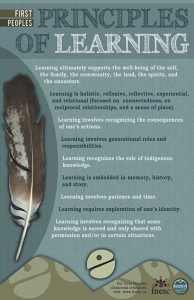What is the First Peoples Principles of Learning (FPPL)?
The following Poster — from FNESC
http://www.fnesc.ca/wp/wp-content/uploads/2015/09/PUB-LFP-POSTER-Principles-of-Learning-First-Peoples-poster-11x17.pdf
C — Blog — by Jo Chrona from FNESC
https://firstpeoplesprinciplesoflearning.wordpress.com/
Learning First Peoples Classroom Resources — from FNESC
http://www.fnesc.ca/learningfirstpeoples/

How does the FPPL connect to the BCTC Standard 9?
BCTC Standard 9 states that, “Educators respect and value the history of First Nations, Inuit and Métis in Canada and
the impact of the past on the present and the future. Educators contribute towards truth,
reconciliation and healing. Educators foster a deeper understanding of ways of knowing
and being, histories, and cultures of First Nations, Inuit and Métis.“
Some ways that educators can do meet the criteria of the BCTC Standard 9 is to:
Focus on connectedness and relationships to oneself, family, community and the
natural world.
• Integrate First Nations, Inuit and Métis worldviews, history and perspectives into learning environments.
• Embed First Peoples Principles of Learning (FPPL) into classroom community of learners
• Embed Truth and Reconciliation (TRC) “Calls to action” in daily classroom activities
https://www.youtube.com/watch?v=w4sBNxiA7YI
EDUC 401 Self-Reflection
https://egeorges.opened.ca/fppl-principle-learning-involves-time-and-patience/
